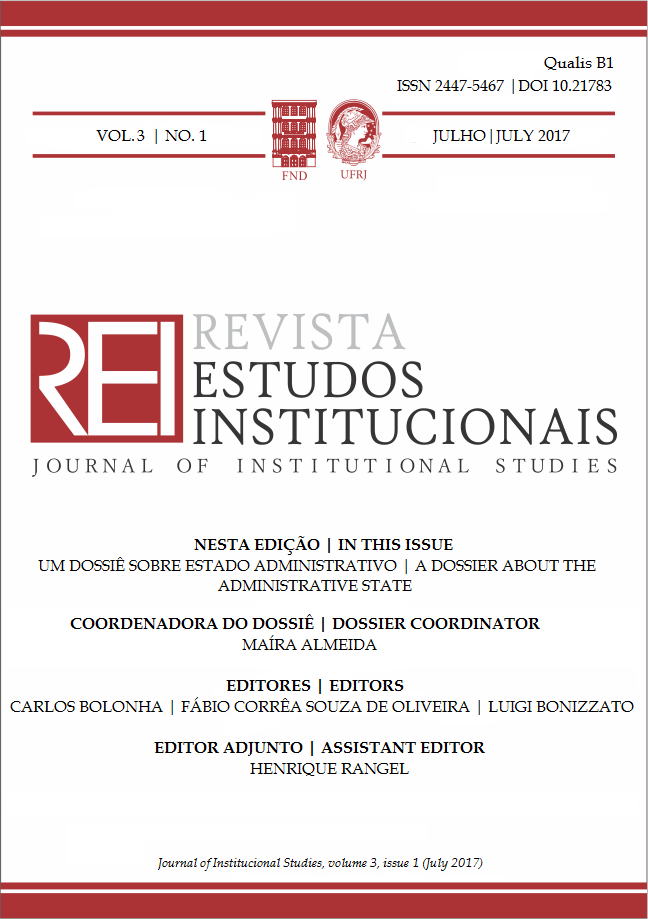DECISÕES RACIONALMENTE ARBITRÁRIAS NO DIREITO ADMINISTRATIVO
DOI:
https://doi.org/10.21783/rei.v3i1.152Palavras-chave:
Agências, Incerteza, Razões de Primeira Ordem, Razões de Segunda Ordem, ArbitrariedadeResumo
Como o Direito Administrativo deve lidar com a incerteza genuína, em que as probabilidades não podem ser associadas aos resultados? Eu argumento que há uma importante categoria de decisões de agências sob incerteza na qual ser arbitrário é racional. A arbitrariedade racional surge quando nenhuma razão de primeira ordem pode fundamentar a escolha da agência, embora a agência tenha válidas razões de segunda ordem para fazer determinada escolha. Quando essas condições prevalecem, até mesmo um jogo de “cara ou coroa” pode ser uma estratégia perfeitamente racional de tomada de decisão para agências. Os tribunais devem adotar uma postura de deferência às decisões racionalmente arbitrárias. Há um papel próprio para as cortes de garantir que agências tenham recursos adequadamente investidos na coleta de informações, o que pode dissipar a incerteza. Ainda assim, o valor de investimentos adicionais na coleta de informações, em alguns casos, será genuinamente incerto. Se assim for, os tribunais devem ter deferência às escolhas de segunda ordem das agências sobre investimentos informacionais pelos mesmos fundamentos que justificam a deferência às escolhas de primeira ordem sob incerteza feitas por agências.
Downloads
Referências
ALEXANDER, Kristina. Warranted but Precluded: What That Means under the Endangered Species Act (ESA). Congressional Research Service, CRS Report 7-5700, 2010.
AL-NAJJAR, Nabil I. A Bayesian Framework for the Precautionary Principle. Journal of Legal Studies, Vol. 44, S-2, 2015.
ARROW, Kenneth; HURWICZ, Leonid. An Optimality Criterion for Decision-Making under Ignorance. In: C.F. Carter; J.L. Ford (eds.). Uncertainty and Expectations in Economics: Essays in Honour of G.L.S. Shackle. Oxford: Oxford University Press, 1972.
BERTSIMAS, Dimitris; SIM, Melvyn. The Price of Robustness. Operations Research, Vol. 52, 1, 2004.
CALABRESI, Guido; BOBBITT, Philip. Tragic Choices. New York, NY: W.W. Norton & Company, 1978.
DIXIT, Avinash; PINDYCK, Robert. Investment under Uncertainty. Princeton, NJ: Princeton University Press, 1994.
DUXBURY, Neil. Random Justice: on Lotteries and Legal Decision-Making. Oxford: Oxford University Press, 2002.
EASLEY, David; KLEINBERG, Jon. Networks, Crowds and Markets: Reasoning about a Highly Connected World. Cambridge, MA: Cambridge University Press, 2010.
ELSTER, Jon. Solomonic Judgments: Studies in the Limitations of Rationality. Cambridge, MA: Cambridge University Press, 1989.
ELSTER, Jon. Excessive Ambitions. Capitalism and Society, Vol. 4, 2, 2009.
FARBER, Daniel. Uncertainty. Georgetown Law Journal, Vol. 99, 4, 2011.
FUDENBERG, Drew; MASKIN, Eric. The Folk Theorem in Repeated Games with Discounting or with Incomplete Information. Econometrica, Vol. 54, 3, 1986.
GILBOA, Itzhak; SCHMEIDLER, David. Maxmin Expected Utility with a Non-Unique Prior. Journal of Mathematical Economics, Vol. 18, 2, 1989.
GIVATI, Yehonatan; STEPHENSON, Matthew. Judicial Deference to Inconsistent Agency Statutory Interpretations. Journal of Legal Studies, Vol. 40, 1, 2011.
GUBLER, Zachary. Experimental Rules. Boston College Law Review, Vol. 55, 1, 2014.
HALPERN, Joseph. Reasoning about Uncertainty. Cambridge, MA: MIT Press, 2005.
JOHANSEN, Leif. Lectures on Macroeconomic Planning. Part 1: General Aspects. Amsterdam: North-Holland, 1977.
KELSEY, David. Choice under Partial Uncertainty. International Economic Review, Vol. 34, 2, 1993.
KELSEY, David; QUIGGIN, John. Theories of Choice under Ignorance and Uncertainty. Journal of Economic Surveys, Vol. 6, 2, 1992.
KEYNES, John Maynard. The General Theory of Employment, Interest and Money. New York, NY: Harcourt, Brace, 1936.
KEYNES, John Maynard. The General Theory of Employment. The Quarterly Journal of Economics, Vol. 51, 2, 1937.
KNIGHT, Frank. Risk, Uncertainty and Profit. Boston: Houghton Mifflin Co., 1921.
KRAUS, Bruce; RASO, Connor. Rational Boundaries for SEC Cost-Benefit Analysis. Yale Journal on Regulation, Vol. 30, 2, 2013.
LEE, Yoon-Ho Alex. An Options Approach to Agency Rulemaking. Administrative Law Review, Vol. 65, 4, 2013.
MATTIX, Carla; BECKER, Kathleen. Scientific Uncertainty under the National Environmental Policy Act. Administrative Law Review, Vol. 54, 3, 2002.
McKENZIE, Richard. On the Methodological Boundaries of Economic Analysis. Journal of Economic Issues, Vol. 12, 3, 1978.
MELBERG, Hans. A Critical Discussion of Jon Elster’s Arguments about Rational Choice, Infinite Regress and the Collection of Information. Unpublished thesis. University of Oslo, Department of Economics, Oslo, 1999.
MNOOKIN, Robert. Child-Custody Adjudication: Judicial Functions in the Face of Indeterminacy. Law and Contemporary Problems, Vol. 39, 3, 1975.
STIGLER, George. The Economics of Information. Journal of Political Economy, Vol. 69, 3, 1961.
STRADLING, David; STRADLING, Richard. Perceptions of the Burning River: Deindustrialization and Cleveland’s Cuyahoga River. Environmental History, Vol. 13, 3, 2008.
SUNSTEIN, Cass. The Arithmetic of Arsenic. Georgetown Law Journal, Vol. 90, 7, 2002.
SUNSTEIN, Cass. Risk and Reason: Safety, Law, and the Environment. Cambridge, MA: Cambridge University Press, 2002.
SUNSTEIN, Cass. Chevron Step Zero. Virginia Law Review, Vol. 92, 2, 2006.
SUNSTEIN, Cass. Worst-Case Scenarios. Cambridge, MA: Harvard University Press, 2007.
SUNSTEIN, Cass; ULLMANN-MARGALIT, Edna. Second-Order Decisions. Ethics, Vol. 110, 1, 1999.
ULLMANN-MARGALIT, Edna; MORGENBESSER, Sidney. Picking and Choosing. Social Research, Vol. 44, 4, 1977.
VERMEULE, Adrian. Law and the Limits of Reason. Oxford: Oxford University Press, 2009.
VERMEULE, Adrian. The Parliament of the Experts. Duke Law Journal, Vol. 58, 8, 2009.
WAGNER, Wendy. The Science Charade in Toxic Risk Regulation. Columbia Law Review, Vol. 95, 7, 1995.
WALD, Abraham. Statistical Decision Functions Which Minimize the Maximum Risk. Annals of Mathematics, Vol. 46, 2, 1945.
WEITZMAN, Martin. On Modeling and Interpreting the Economics of Catastrophic Climate Change. Review of Economics and Statistics, Vol. 91, 1, 2009.
WIENER, Jonathan Baert. Managing the Iatrogenic Risks of Risk Management. Risk: Health, Safety and Environment, Vol. 9, 1, 1998.
WINTER, JR., Sidney. Economic “Natural Selection” and the Theory of the Firm. Yale Economic Essays, Vol. 4, 1, 1964.
WOODWARD, Richard; BISHOP, Richard. How to Decide When Experts Disagree: Uncertainty-Based Choice Rules in Environmental Policy. Land Economics, Vol. 73, 4, 1997.
YOHE, Gary; TOL, Richard. Precaution and a Dismal Theorem: Implications for Climate Policy and Climate Research. Working Paper FNU, No. 145, 2007.
Downloads
Publicado
Como Citar
Edição
Seção
Licença
Autores que publicam nesta revista concordam com os seguintes termos:
- Autores mantém os direitos autorais e concedem à revista o direito de primeira publicação, com o trabalho simultaneamente licenciado sob a Licença Creative Commons Attribution que permite o compartilhamento do trabalho com reconhecimento da autoria e publicação inicial nesta revista.
- Autores têm autorização para assumir contratos adicionais separadamente, para distribuição não-exclusiva da versão do trabalho publicada nesta revista (ex.: publicar em repositório institucional ou como capítulo de livro), com reconhecimento de autoria e publicação inicial nesta revista.
- Autores têm permissão e são estimulados a publicar e distribuir seu trabalho online após a publicação na revista.






